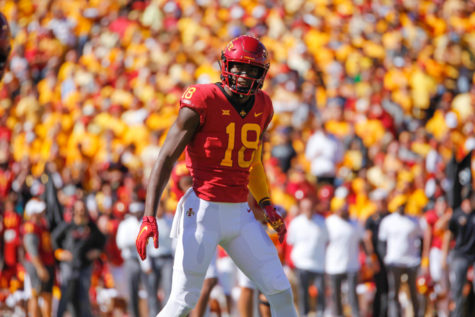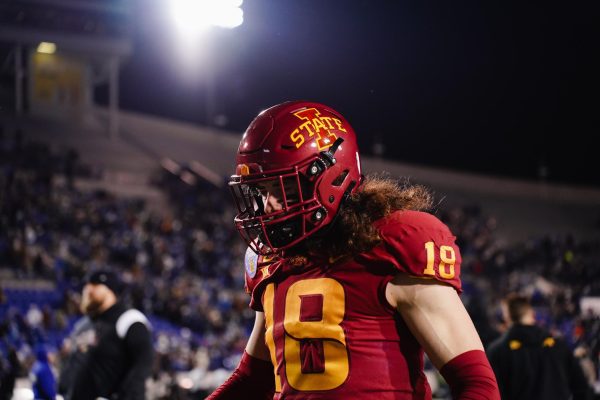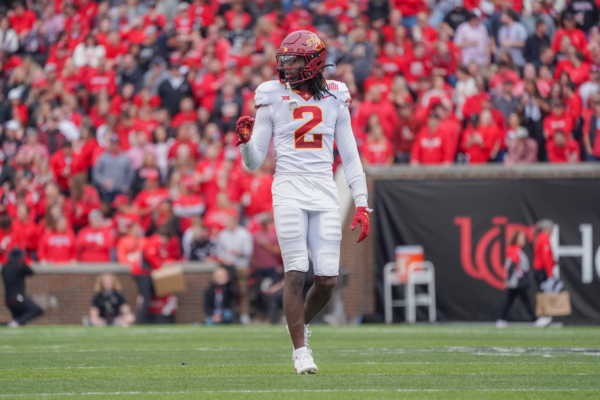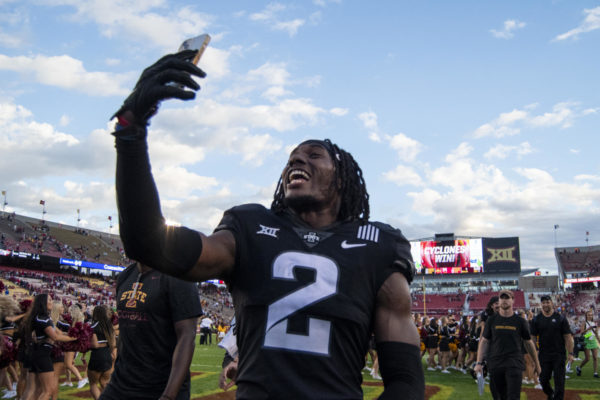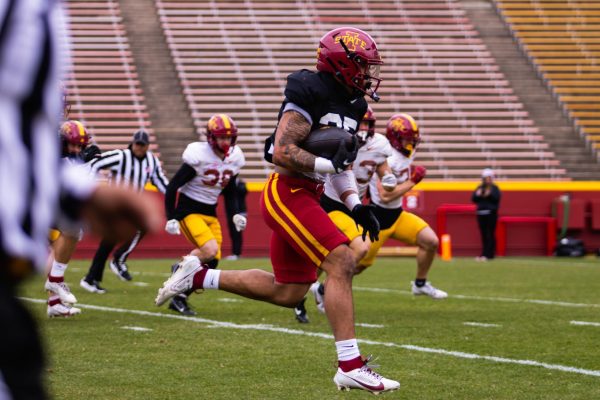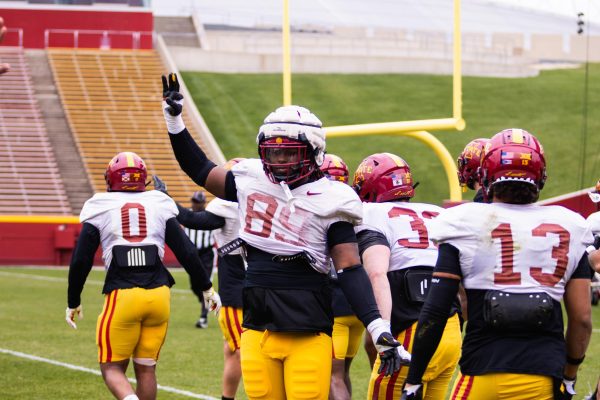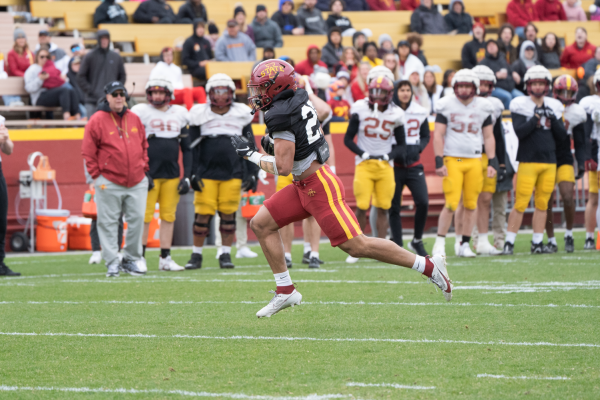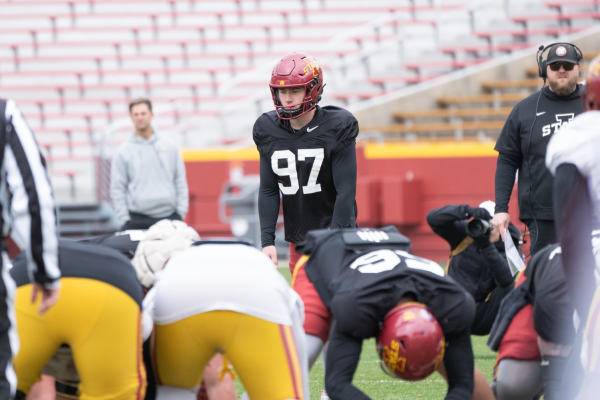FOOTBALL: Cyclones hope to tame Tigers
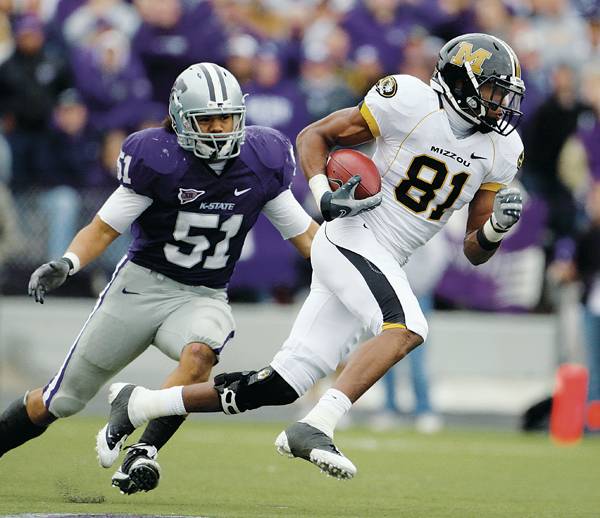
Missouri wide receiver Danario Alexander, 81, gets away from Kansas State linebacker Ulla Pomele, 51, as he runs the ball 80 yards for a touchdown during the third quarter in Manhattan, Kan. Missouri won the game 38-12. Photo: Charlie Riedel/The Associated Press
November 19, 2009
Although Iowa State finally achieved bowl eligibility for the first time since 2005, things don’t get any easier for the Cyclones.
Instead, Iowa State’s (6-5, 3-4 in Big 12) reward is a trip to Columbia, Mo., to battle its Big 12 rival Missouri (6-4, 2-4) in the 2009 season finale.
Missouri, the Big 12 North champion for the last two seasons, has been up and down throughout much of 2009. The Tigers started 4-0, but have since dropped four of their last six games.
“This is a program [that] is embarrassed by how many losses they have, and they see an opportunity to still finish up 8–4,” ISU coach Paul Rhoads said of his week-12 opponent.
Much of Missouri’s struggles of late have come from their normally prolific offense. A unit that has been dominant in its last few seasons has struggled to put up points in the second half of games in Big 12 play.
In the Tigers’ first four conference games against Nebraska, Oklahoma State, Texas and Colorado, they combined to score just six points after halftime.
However, Rhoads expects to see the best Missouri’s high-powered attack has to offer.
“I expect to see an up week for them,” Rhoads said. “This is a program that knows how to win.”
The Missouri offense is led by sophomore quarterback Blaine Gabbert, who, although hampered by an ankle injury for several weeks, has piled up 2,662 passing yards and 20 touchdowns in just 10 games as Missouri’s starter.
Gabbert’s favorite target has been, without a doubt, senior receiver Danario Alexander.
Alexander, the Big 12’s top receiver, has accounted for 1,238 of Gabbert’s passing yardage, as well as hauling in 11 touchdown passes.
“He can play. I’ve seen far more [of Alexander] than I’d like to see,” Rhoads said. “He doesn’t look like he’s running fast, but people can’t catch him. He slithers and snakes and he gets himself through, and he beats you deep and he catches everything.”
So, how do the Cyclones hope to slow down the 6-foot-5-inch wideout?
Defensive coordinator Wally Burnham said “it’s going to be quite a task” for the ISU defense, 11th in the Big 12 in overall defense and eighth in the conference against the pass.
“You just try to limit his yards after the catch,” Burnham said. “You’ve got to get a body on him as much as possible and get some tight coverage on him.”
Alexander has gone off in his last three games, combining for 31 catches, 537 yards and five touchdowns in those games — a stretch in which Missouri was 2-1.
Missouri has a 4-2 record in 2009 while Alexander has more than 100 yards receiving.
“He’s a playmaker, and they’re going to be looking his way for him to make some big time catches, and he’s going to make some,” senior linebacker Fred Garrin said. “You can’t really play to one person, but you play in the defense and hope that your coverage and your pass rush hold up.”
Gabbert and Alexander aren’t the only ones the Cyclones are worried about while they prepare to face the Big 12’s seventh-best offense.
Junior running back Derrick Washington has also been a playmaker for the Tigers in his career in Columbia.
Although Washington has only run for 630 yards this season, he had 1,036 yards last season and has done all that the Missouri coach Gary Pinkel has asked him to do this season.
“It seems like every time you turn the tape on and it’s a running play they get five yards or six yards. They just don’t stay with it a whole lot,” Burnham said.
The task of stopping the multi-faceted Missouri offense falls then to the much-improved ISU defense.
While the Cyclones are near the bottom of the Big 12 in terms of yards allowed, they are giving up almost half as many points in Big 12 play as they did last season — 23 points per game in conference this year compared to 41.8 per game last year.
Missouri’s offense has also taken steps forward in 2009.
The ninth-best defense in the Big 12 in 2008 is now allowing the fifth-fewest yards in the conference.
“They’re going to make you work for everything that you get,” Rhoads said, “and much like our defensive football team, they’re going to put themselves in a position to win a football game.”
Another tough defensive matchup isn’t likely to be what the doctor orders for the struggling ISU offense.
Since quarterback Austen Arnaud went down with a hand injury against Baylor, the Cyclones have scored just 11 points per game.
“A lot of the offense coming around and doing more than it has the last few games, specifically from a point output, is our execution,” Rhoads said.
Rhoads also said he’s counting on Missouri’s defense giving his offense similar looks that the defenses of Iowa State’s last four opponents have.
“It’s a matter of finding answers and executing at a higher proficiency rate than we have been,” he said.
Another aspect of the matchup with Missouri that goes by the wayside many times is that of the Telephone Trophy, the award — similar to the Cy-Hawk Trophy — given to the winner of the teams’ annual get-together.
The trophy was born after, in 1959, the telephone wires from the coaches’ box to the field were crossed and each team could hear the other’s communication.
“We look at it as another game,” Garrin said. “But knowing that Coach Rhoads has the attitude that this is a rivalry game, we want to come home with the trophy.”







